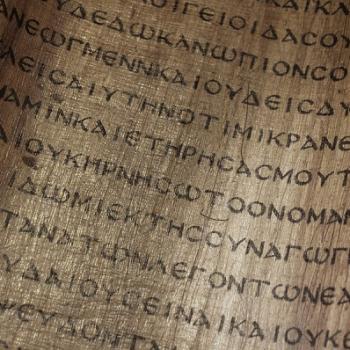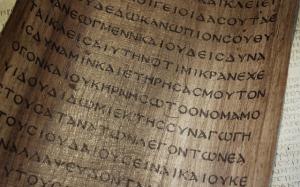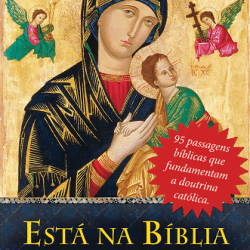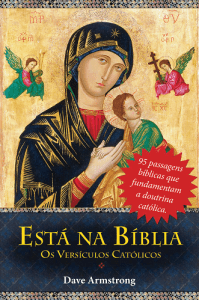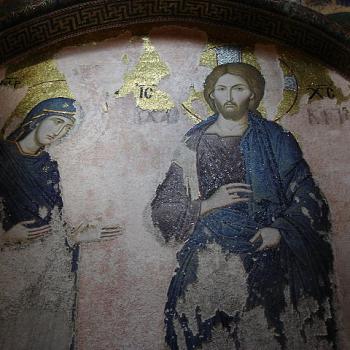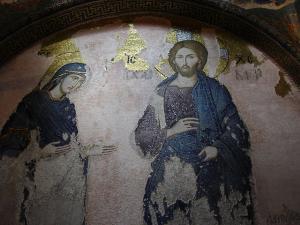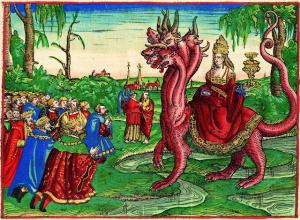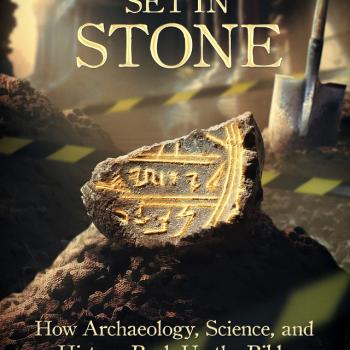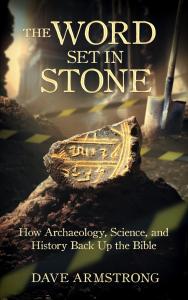[see the book info-page for this volume/ buy Kindle or Nook versions]
*
Chapter one (pp. 5-55) of my book, Bible Truths for Catholic Truths: A Source Book for Apologists and Inquirers (Manchester, New Hampshire: Sophia Institute Press, 2009); the paperback is now out-of-print. This book could also be known as Dave’s Topical Bible, and contains over 1,900 Bible passages, categorized under 115 thematic headings. I am now offering it online for free.
*
In these blog posts I use — for readers’ convenience — the original RSV of the manuscript (© 1971 by Division of Christian Education of the National Council of the Churches of Christ in the United States of America), rather than KJV, which was mostly used in the paperback, due to copyright law. This book is all Bible, except for a few clarifying comments here and there. Subtitles sometimes differ from the published version. They are my own original titles.
*****
DEDICATION
To St. Paul: the model for all evangelists and apologists, and St. Peter: the model for popes and all other leaders of the Church.
*****
INTRODUCTION
The aim of this book is very simple (hence the short introduction), and it reflects much of the emphasis in my Catholic apologetic efforts for the last 18 years. I want to provide the biblical rationale for Catholic beliefs. The subject matter is as endless as the riches, wisdom, and depths of the Bible itself.
My immediate goal is to simply present categorized Bible passages. My own commentary will be kept to a minimum and used only in instances where I am straightforwardly reiterating what Holy Scripture itself states, noting relevant contextual considerations, Greek or Hebrew meanings of words (as explicated by linguistic scholars), or scriptural cross-references.
I have, of course, selected the passages and classified them. Insofar as I did that, I was engaging in “systematic theology.” Human input (something beyond God’s own words) is necessary as soon as one goes beyond simply placing a Bible on a table in front of someone and saying, “read all of this: it completely supports what Catholics teach.”
In all reasonable argumentation whatever, selective presentation takes place, and in systematic theology, it is necessary to locate the relevant biblical texts and to collect them for the purpose of illustrating that “the Bible teaches thus and so about this particular topic.” And that involves judgment, which in turn includes a bias.
In that sense, this book is not just the Bible. My input and editing and orthodox Catholic presuppositions are present. But the central, essential focus is “just the Bible.” Holy, Sacred Scripture is thoroughly “Catholic,” as I hope to demonstrate in great detail. Praise God for His wonderful, materially sufficient revelation and His aid in helping us to understand and live by it.
Some Catholic teachings are less well-attested by direct scriptural indications than others. Yet I believe those doctrines are also “soaked” in the spirit of the Bible. The comprehensive selection of texts herein repeatedly demonstrates this, in my opinion. A multitude of pointers can be as compelling as a single unambiguous signpost, to show us our way. Readers are free to decide the relative strength of individual textual evidence.
Reading these extracts in their full context is even more rewarding and illuminating. The Bible is a harmonious whole: “living and active”, and should be interpreted as such, rather than picked apart into fragments. For the purpose of systematic doctrinal study, however, it is quite helpful to categorize texts. Moreover, Catholics emphasize that the Bible is organically related to the tradition and the Church in which it is received and interpreted. If this book helps readers to move beyond arguments into a deeper appreciation of the Word of God, in which lies our salvation, I will be more than happy.
Lastly, Catholics and Protestants notoriously disagree as to which books constitute the biblical canon. The number of the inspired books accepted by the universal Church prior to the onset of Protestantism was disputed by Martin Luther and other non-Catholic Christians, and seven books were eventually omitted altogether in most Protestant editions of the Bible, or included separately as sub-canonical “apocryphal” texts. Some of these refer directly to distinctively Catholic doctrines (most notably, purgatory). I’ve included relatively few citations from these “disputed” books, but for the Catholic, they are Scripture, too, and ought not be excluded. If the non-Catholic reader wishes to pass over them, more than ample texts remain as “evidences.”
*****
AUTHORITATIVE SACRED TRADITION (PARADOSIS)
Matthew 23:1-3 Then said Jesus to the crowds and to his disciples, “The scribes and the Pharisees sit on Moses’ seat; so practice and observe whatever they tell you, but not what they do; for they preach, but do not practice.
1 Corinthians 11:2 I commend you because you remember me in everything and maintain the traditions even as I have delivered them to you.
1 Corinthians 11:23 For I received from the Lord what I also delivered to you, . . .
1 Corinthians 15:3 For I delivered to you as of first importance what I also received, that Christ died for our sins in accordance with the scriptures,
Colossians 2:8 See to it that no one makes a prey of you by philosophy and empty deceit, according to human tradition, according to the elemental spirits of the universe, and not according to Christ.
2 Thessalonians 2:15 . . . stand firm and hold to the traditions which you were taught by us, either by word of mouth, or by letter.
2 Thessalonians 3:6 . . . the tradition that you received from us.
2 Thessalonians 3:14 If any one refuses to obey what we say in this letter, note that man, and have nothing to do with him, that he may be ashamed.
In 2 Thessalonians “gospel” is mentioned twice (1:8 and 2:14), “tradition” twice (2:15 and 3:6), but neither “Scripture” nor “Scriptures” appears. “Word of the Lord” appears once (3:1), but it appears not to refer to the Bible.
2 Timothy 2:2 And what you have heard from me before many witnesses entrust to faithful men who will be able to teach others also.
AUTHORITATIVE ORAL TRADITION (INCLUDING “WORD” AND “WORD OF GOD”) (50 PASSAGES)
Matthew 13:20 As for what was sown on rocky ground, this is he who hears the word and immediately receives it with joy; (other instances of “the word”: Matt 13:19, 21-23; Mk 2:2; 4:14-20, 33; Lk 1:2; 8:12-13, 15; Jn 1:1, 14 [of Jesus]; Jn 14:24; Acts 6:4; 8:4; 11:19; 14:25; 16:6; Gal 6:6; Eph 5:26; Col 4:3; 1 Pet 3:1)
Luke 5:1 While the people pressed upon him to hear the word of God, he was standing by the lake of Gennes’aret. (other instances of “word of God”: Lk 3:2; 8:11,21; Jn 17:8; Acts 6:2; 13:5,7,44,48; 17:13; 18:11; Rom 9:6; 1 Cor 14:36; Eph 6:17; Phil 1:14; Col 1:25; 1 Tim 4:5; 2 Tim 2:9; Titus 2:5; Heb 6:5; 13:7; 1 Jn 2:14; Rev 1:9; 20:4)
Luke 11:28 But he said, “Blessed rather are those who hear the word of God and keep it!”
Acts 4:4 But many of those who heard the word believed; and the number of the men came to about five thousand. (cf. Acts 2:41)
Acts 4:31 And when they had prayed, the place in which they were gathered together was shaken; and they were all filled with the Holy Spirit and spoke the word of God with boldness.
Acts 6:7 And the word of God increased; and the number of the disciples multiplied greatly in Jerusalem, and a great many of the priests were obedient to the faith. (cf. 12:24)
Acts 8:14 . . . Sama’ria had received the word of God . . . (cf. 11:1)
Acts 8:25 Now when they had testified and spoken the word of the Lord, they returned to Jerusalem, preaching the gospel to many villages of the Samaritans. (other instances of “word of the Lord”: Acts 15:35-36; 16:32; 19:10, 20; 1 Thess 1:8; 4:15; 2 Thess 3:1)
Acts 10:36-44 You know the word which he sent to Israel, preaching good news of peace by Jesus Christ (he is Lord of all), the word which was proclaimed throughout all Judea, beginning from Galilee after the baptism which John preached: how God anointed Jesus of Nazareth with the Holy Spirit and with power; how he went about doing good and healing all that were oppressed by the devil, for God was with him. And we are witnesses to all that he did both in the country of the Jews and in Jerusalem. They put him to death by hanging him on a tree; but God raised him on the third day and made him manifest; not to all the people but to us who were chosen by God as witnesses, who ate and drank with him after he rose from the dead. And he commanded us to preach to the people, and to testify that he is the one ordained by God to be judge of the living and the dead. To him all the prophets bear witness that every one who believes in him receives forgiveness of sins through his name. While Peter was still saying this, the Holy Spirit fell on all who heard the word.
Acts 13:46 And Paul and Barnabas spoke out boldly, saying, “It was necessary that the word of God should be spoken first to you. Since you thrust it from you, and judge yourselves unworthy of eternal life, behold, we turn to the Gentiles.”
Acts 13:49 And the word of the Lord spread throughout all the region.
Acts 14:3 So they remained for a long time, speaking boldly for the Lord, who bore witness to the word of his grace, granting signs and wonders to be done by their hands. (cf. Acts 20:32: “word of his grace”)
Acts 15:7 And after there had been much debate, Peter rose and said to them, “Brethren, you know that in the early days God made choice among you, that by my mouth the Gentiles should hear the word of the gospel and believe.”
Acts 15:27 We have therefore sent Judas and Silas, who themselves will tell you the same things by word of mouth.
Acts 17:11 Now these Jews were more noble than those in Thessaloni’ca, for they received the word with all eagerness, examining the scriptures daily to see if these things were so.
Romans 10:8 But what does it say? The word is near you, on your lips and in your heart (that is, the word of faith which we preach);
Romans 16:25 Now to him who is able to strengthen you according to my gospel and the preaching of Jesus Christ, according to the revelation of the mystery which was kept secret for long ages
1 Corinthians 1:18 For the word of the cross is folly to those who are perishing, but to us who are being saved it is the power of God.
1 Corinthians 14:29-30 Let two or three prophets speak, and let the others weigh what is said. If a revelation is made to another sitting by, let the first be silent.
2 Corinthians 3:6 who has made us competent to be ministers of a new covenant, not in a written code but in the Spirit; for the written code kills, but the Spirit gives life.
Ephesians 1:13 In him you also, who have heard the word of truth, the gospel of your salvation, and have believed in him, were sealed with the promised Holy Spirit, (cf. 2 Tim 2:15: “word of truth”)
Philippians 2:16 holding fast the word of life, so that in the day of Christ I may be proud that I did not run in vain or labor in vain. (cf. 1 John 1:1: “word of life”)
Philippians 4:9 What you have learned and received and heard and seen in me, do; and the God of peace will be with you.
Colossians 1:5-6 because of the hope laid up for you in heaven. Of this you have heard before in the word of the truth, the gospel which has come to you, as indeed in the whole world it is bearing fruit and growing — so among yourselves, from the day you heard and understood the grace of God in truth,
Colossians 3:16 Let the word of Christ dwell in you richly, teach and admonish one another in all wisdom, and sing psalms and hymns and spiritual songs with thankfulness in your hearts to God.
1 Thessalonians 1:6 And you became imitators of us and of the Lord, for you received the word in much affliction, with joy inspired by the Holy Spirit;
1 Thessalonians 2:13 And we also thank God constantly for this, that when you received the word of God which you heard from us, you accepted it not as the word of men but as what it really is, the word of God, which is at work in you believers.
In 1 Thessalonians “Scripture” or “Scriptures” never appear. “Word,” “word of the Lord,” or “word of God” appear five times (1:6, 8, 2:13 [twice], 4:15), but in each instance it is clearly in the sense of oral proclamation, not Scripture.
2 Thessalonians 2:15 . . . stand firm and hold to the traditions which you were taught by us, either by word of mouth, or by letter.
2 Timothy 1:13-14 Follow the pattern of the sound words which you have heard from me . . . guard the truth which has been entrusted to you by the Holy Spirit who dwells within us.
2 Timothy 2:2 And what you have heard from me before many witnesses entrust to faithful men who will be able to teach others also.
2 Timothy 4:2 preach the word, be urgent in season and out of season, convince, rebuke, and exhort, be unfailing in patience and in teaching.
Hebrews 2:1-4 Therefore we must pay the closer attention to what we have heard, lest we drift away from it. For if the message declared by angels was valid and every transgression or disobedience received a just retribution, how shall we escape if we neglect such a great salvation? It was declared at first by the Lord, and it was attested to us by those who heard him, while God also bore witness by signs and wonders and various miracles and by gifts of the Holy Spirit distributed according to his own will.
Hebrews 4:12 For the word of God is living and active, sharper than any two-edged sword, piercing to the division of soul and spirit, of joints and marrow, and discerning the thoughts and intentions of the heart.
Hebrews 5:13 for every one who lives on milk is unskilled in the word of righteousness, for he is a child.
Hebrews 13:7 Remember your leaders, those who spoke to you the word of God; consider the outcome of their life, and imitate their faith.
James 1:18 Of his own will he brought us forth by the word of truth that we should be a kind of first fruits of his creatures.
James 1:22-23 But be doers of the word, and not hearers only, deceiving yourselves. For if any one is a hearer of the word and not a doer, he is like a man who observes his natural face in a mirror;
1 Peter 1:23 You have been born anew, not of perishable seed but of imperishable, through the living and abiding word of God;
1 Peter 1:25 “but the word of the Lord abides for ever.” That word is the good news which was preached to you.
1 Peter 2:8 . . . they stumble because they disobey the word, as they were destined to do.
2 Peter 1:19, 21 And we have the prophetic word made more sure. You will do well to pay attention to this as to a lamp shining in a dark place, until the day dawns and the morning star rises in your hearts. . . . no prophecy ever came by the impulse of man, but men moved by the Holy Spirit spoke from God.
1 John 1:5 This is the message we have heard from him and proclaim to you, that God is light and in him is no darkness at all.
1 John 2:7 Beloved, I am writing you no new commandment, but an old commandment which you had from the beginning; the old commandment is the word which you have heard.
1 John 2:24 Let what you heard from the beginning abide in you. If what you heard from the beginning abides in you, then you will abide in the Son and in the Father.
1 John 3:11 For this is the message which you have heard from the beginning, that we should love one another,
2 John 1:6 And this is love, that we follow his commandments; this is the commandment, as you have heard from the beginning, that you follow love.
Revelation 1:2 who bore witness to the word of God and to the testimony of Jesus Christ, even to all that he saw.
Revelation 3:3 Remember then what you received and heard; keep that, and repent. If you will not awake, I will come like a thief, and you will not know at what hour I will come upon you.
Revelation 3:10 Because you have kept my word of patient endurance, I will keep you from the hour of trial which is coming on the whole world, to try those who dwell upon the earth.
Revelation 6:9 When he opened the fifth seal, I saw under the altar the souls of those who had been slain for the word of God and for the witness they had borne;
NEW TESTAMENT ALLUSIONS TO AUTHORITATIVE ORAL TEACHING NOT RECORDED IN SCRIPTURE
Matthew 13:3 And he told them many things in parables, . . .
Matthew 28:20 teaching them to observe all that I have commanded you; and lo, I am with you always, to the close of the age.
Mark 4:2 And he taught them many things in parables, . . . . .
Mark 4:33 With many such parables he spoke the word to them, as they were able to hear it;
Mark 6:34 As he went ashore he saw a great throng, and he had compassion on them, because they were like sheep without a shepherd; and he began to teach them many things.
Luke 11:53 As he went away from there, the scribes and the Pharisees began to press him hard, and to provoke him to speak of many things,
Luke 24:15-16, 25-27 While they were talking and discussing together, Jesus himself drew near and went with them. But their eyes were kept from recognizing him. . . . And he said to them, “O foolish men, and slow of heart to believe all that the prophets have spoken! Was it not necessary that the Christ should suffer these things and enter into his glory?” And beginning with Moses and all the prophets, he interpreted to them in all the scriptures the things concerning himself.
John 16:12 I have yet many things to say to you, but you cannot bear them now.
John 20:30 Now Jesus did many other signs in the presence of the disciples, which are not written in this book; (cf. Jn 21:25: “many other things which Jesus did”)
Acts 1:2-3 until the day when he was taken up, after he had given commandment through the Holy Spirit to the apostles whom he had chosen. To them he presented himself alive after his passion by many proofs, appearing to them during forty days, and speaking of the kingdom of God.
NEW TESTAMENT CITATIONS OF OLDER NON-BIBLICAL ORAL TRADITIONS
Matthew 2:23 And he went and dwelt in a city called Nazareth, that what was spoken by the prophets might be fulfilled, “He shall be called a Nazarene.”
This notion cannot be found in the Old Testament, yet it was passed down “by the prophets.” Thus, a prophecy, which is considered to be “God’s Word” was passed down orally, rather than through Scripture.
Matthew 7:12 So whatever you wish that men would do to you, do so to them; for this is the law and the prophets.
Matthew 23:2 The scribes and the Pharisees sit on Moses’ seat;
The phrase or idea of Moses’ seat cannot be found anywhere in the Old Testament. It is found in the (originally oral) Mishna, where a sort of “teaching succession” from Moses on down is taught.
1 Corinthians 10:4 and all drank the same supernatural drink. For they drank from the supernatural Rock which followed them, and the Rock was Christ.
The Old Testament says nothing about such miraculous movement, in the related passages about Moses striking the rock to produce water (Exodus 17:1-7; Numbers 20:2-13). But rabbinic tradition does.
2 Timothy 3:8 As Jannes and Jambres opposed Moses, so these men also oppose the truth, men of corrupt mind and counterfeit faith;
These two men cannot be found in the related Old Testament passage (Exodus 7:8 ff.), or anywhere else in the Old Testament.
James 5:17 Eli’jah was a man of like nature with ourselves and he prayed fervently that it might not rain, and for three years and six months it did not rain on the earth.
The reference to a lack of rain for three years is absent from the relevant Old Testament passage in 1 Kings 17.
1 Peter 3:19 in which he went and preached to the spirits in prison,
This is drawn from the Jewish apocalyptic book 1 Enoch (12-16).
Jude 9 But when the archangel Michael, contending with the devil, disputed about the body of Moses, he did not presume to pronounce a reviling judgment upon him, but said, “The Lord rebuke you.”
Jude 14-15 It was of these also that Enoch in the seventh generation from Adam prophesied, saying, “Behold, the Lord came with his holy myriads, to execute judgment on all, and to convict all the ungodly of all their deeds of ungodliness which they have committed in such an ungodly way, and of all the harsh things which ungodly sinners have spoken against him.”
This is a direct quotation of 1 Enoch 1:9.
“THE FAITH” AS SYNONYMOUS WITH SACRED TRADITION
Acts 6:7 And the word of God increased; and the number of the disciples multiplied greatly in Jerusalem, and a great many of the priests were obedient to the faith.
Acts 13:8 But El’ymas the magician (for that is the meaning of his name) withstood them, seeking to turn away the proconsul from the faith.
Acts 14:22 strengthening the souls of the disciples, exhorting them to continue in the faith, and saying that through many tribulations we must enter the kingdom of God.
Acts 16:5 So the churches were strengthened in the faith, and they increased in numbers daily.
Galatians 1:23 they only heard it said, “He who once persecuted us is now preaching the faith he once tried to destroy.”
Ephesians 4:13 until we all attain to the unity of the faith and of the knowledge of the Son of God, to mature manhood, to the measure of the stature of the fulness of Christ;
Philippians 1:25, 27 Convinced of this, I know that I shall remain and continue with you all, for your progress and joy in the faith, . . . Only let your manner of life be worthy of the gospel of Christ, so that whether I come and see you or am absent, I may hear of you that you stand firm in one spirit, with one mind striving side by side for the faith of the gospel,
Colossians 1:23 provided that you continue in the faith, stable and steadfast, not shifting from the hope of the gospel which you heard, which has been preached to every creature under heaven, and of which I, Paul, became a minister.
Colossians 2:7 rooted and built up in him and established in the faith, just as you were taught, abounding in thanksgiving.
1 Timothy 1:2 To Timothy, my true child in the faith: . . .
1 Timothy 3:9, 13 they must hold the mystery of the faith with a clear conscience. . . . for those who serve well as deacons gain a good standing for themselves and also great confidence in the faith which is in Christ Jesus.
1 Timothy 4:1 Now the Spirit expressly says that in later times some will depart from the faith by giving heed to deceitful spirits and doctrines of demons,
1 Timothy 4:6 If you put these instructions before the brethren, you will be a good minister of Christ Jesus, nourished on the words of the faith and of the good doctrine which you have followed.
1 Timothy 5:8 If any one does not provide for his relatives, and especially for his own family, he has disowned the faith and is worse than an unbeliever.
1 Timothy 6:10, 12 For the love of money is the root of all evils; it is through this craving that some have wandered away from the faith and pierced their hearts with many pangs. . . . Fight the good fight of the faith; take hold of the eternal life to which you were called when you made the good confession in the presence of many witnesses.
1 Timothy 6:21 for by professing it some have missed the mark as regards the faith. Grace be with you.
2 Timothy 4:7 I have fought the good fight, I have finished the race, I have kept the faith.
Titus 1:1 Paul, a servant of God and an apostle of Jesus Christ, to further the faith of God’s elect and their knowledge of the truth which accords with godliness,
Titus 1:13 . . . Therefore rebuke them sharply, that they may be sound in the faith,
Titus 3:15 . . . Greet those who love us in the faith. Grace be with you all.
James 2:1 My brethren, show no partiality as you hold the faith of our Lord Jesus Christ, the Lord of glory.
Jude 3 . . . contend for the faith which was once for all delivered to the saints.
Revelation 14:12 Here is a call for the endurance of the saints, those who keep the commandments of God and the faith of Jesus.
“THE TRUTH” AS SYNONYMOUS WITH SACRED TRADITION
Luke 1:1-4 Inasmuch as many have undertaken to compile a narrative of the things which have been accomplished among us, just as they were delivered to us by those who from the beginning were eyewitnesses and ministers of the word, it seemed good to me also, having followed all things closely for some time past, to write an orderly account for you, most excellent The-oph’ilus, that you may know the truth concerning the things of which you have been informed.
John 1:17 For the law was given through Moses; grace and truth came through Jesus Christ.
John 4:23 But the hour is coming, and now is, when the true worshipers will worship the Father in spirit and truth, for such the Father seeks to worship him.
John 8:31-32 Jesus then said to the Jews who had believed in him, “If you continue in my word, you are truly my disciples, and you will know the truth, and the truth will make you free.”
John 14:6 Jesus said to him, “I am the way, and the truth, and the life; no one comes to the Father, but by me.”
John 15:26 But when the Counselor comes, whom I shall send to you from the Father, even the Spirit of truth, who proceeds from the Father, he will bear witness to me;
John 16:13 When the Spirit of truth comes, he will guide you into all the truth; for he will not speak on his own authority, but whatever he hears he will speak, and he will declare to you the things that are to come.
John 17:17, 19 Sanctify them in the truth; thy word is truth. . . . And for their sake I consecrate myself, that they also may be consecrated in truth.
John 18:37 Pilate said to him, “So you are a king?” Jesus answered, “You say that I am a king. For this I was born, and for this I have come into the world, to bear witness to the truth. Every one who is of the truth hears my voice.”
John 19:35 He who saw it has borne witness — his testimony is true, and he knows that he tells the truth — that you also may believe.
Romans 2:8 but for those who are factious and do not obey the truth, but obey wickedness, there will be wrath and fury.
1 Corinthians 2:13 And we impart this in words not taught by human wisdom but taught by the Spirit, interpreting spiritual truths to those who possess the Spirit.
2 Corinthians 4:2 We have renounced disgraceful, underhanded ways; we refuse to practice cunning or to tamper with God’s word, but by the open statement of the truth we would commend ourselves to every man’s conscience in the sight of God.
2 Corinthians 11:10 . . . the truth of Christ is in me . . .
2 Corinthians 13:8 For we cannot do anything against the truth, but only for the truth.
Galatians 5:7 You were running well; who hindered you from obeying the truth?
Ephesians 1:13 In him you also, who have heard the word of truth, the gospel of your salvation, and have believed in him, were sealed with the promised Holy Spirit, (cf. 6:14)
Colossians 1:5 because of the hope laid up for you in heaven. Of this you have heard before in the word of the truth, the gospel
2 Thessalonians 2:10-13 and with all wicked deception for those who are to perish, because they refused to love the truth and so be saved. Therefore God sends upon them a strong delusion, to make them believe what is false, so that all may be condemned who did not believe the truth but had pleasure in unrighteousness. But we are bound to give thanks to God always for you, brethren beloved by the Lord, because God chose you from the beginning to be saved, through sanctification by the Spirit and belief in the truth.
1 Timothy 2:4 who desires all men to be saved and to come to the knowledge of the truth.
1 Timothy 3:15 if I am delayed, you may know how one ought to behave in the household of God, which is the church of the living God, the pillar and bulwark of the truth.
1 Timothy 4:3 . . . those who believe and know the truth.
2 Timothy 1:13-14 Follow the pattern of the sound words which you have heard from me . . . guard the truth which has been entrusted to you by the Holy Spirit who dwells within us.
2 Timothy 2:18 who have swerved from the truth by holding that the resurrection is past already. . . .
2 Timothy 2:25 . . . God may perhaps grant that they will repent and come to know the truth,
2 Timothy 3:7-8 who will listen to anybody and can never arrive at a knowledge of the truth. As Jannes and Jambres opposed Moses, so these men also oppose the truth, men of corrupt mind and counterfeit faith;
2 Timothy 4:4 and will turn away from listening to the truth and wander into myths.
Titus 1:1 Paul, a servant of God and an apostle of Jesus Christ, to further the faith of God’s elect and their knowledge of the truth which accords with godliness, (cf. 1:14)
Hebrews 10:26 For if we sin deliberately after receiving the knowledge of the truth, there no longer remains a sacrifice for sins,
James 5:19 My brethren, if any one among you wanders from the truth and some one brings him back,
1 Peter 1:22 Having purified your souls by your obedience to the truth for a sincere love of the brethren, love one another earnestly from the heart.
2 Peter 1:12 Therefore I intend always to remind you of these things, though you know them and are established in the truth that you have.
1 John 1:6 If we say we have fellowship with him while we walk in darkness, we lie and do not live according to the truth;
1 John 2:21 I write to you, not because you do not know the truth, but because you know it, and know that no lie is of the truth.
1 John 3:19 By this we shall know that we are of the truth, and reassure our hearts before him
1 John 4:6 We are of God. Whoever knows God listens to us, and he who is not of God does not listen to us. By this we know the spirit of truth and the spirit of error.
1 John 5:7 And the Spirit is the witness, because the Spirit is the truth.
2 John 1:1-4 The elder to the elect lady and her children, whom I love in the truth, and not only I but also all who know the truth, because of the truth which abides in us and will be with us for ever: Grace, mercy, and peace will be with us, from God the Father and from Jesus Christ the Father’s Son, in truth and love. I rejoiced greatly to find some of your children following the truth, just as we have been commanded by the Father.
3 John 1:1, 3-4 The elder to the beloved Ga’ius, whom I love in the truth. . . . indeed you do follow the truth. No greater joy can I have than this, to hear that my children follow the truth.
3 John 1:8, 12 . . . that we may be fellow workers in the truth. . . . Deme’trius has testimony from every one, and from the truth itself; I testify to him too, and you know my testimony is true.
“THE COMMANDMENT” AS SYNONYMOUS WITH SACRED TRADITION
Matthew 15:3, 6 And why do you transgress the commandment of God for the sake of your tradition? . . . So, for the sake of your tradition, you have made void the word of God.
Mark 7:8, 13 You leave the commandment of God, and hold fast the tradition of men. . . . thus making void the word of God through your tradition which you hand on. And many such things you do.
1 Timothy 6:14 I charge you to keep the commandment unstained and free from reproach until the appearing of our Lord Jesus Christ;
2 Peter 2:21 . . . the holy commandment delivered to them.
2 Peter 3:1-2 This is now the second letter that I have written to you, beloved, and in both of them I have aroused your sincere mind by way of reminder; that you should remember the predictions of the holy prophets and the commandment of the Lord and Savior through your apostles.
1 John 2:3-8 And by this we may be sure that we know him, if we keep his commandments. He who says “I know him” but disobeys his commandments is a liar, and the truth is not in him; but whoever keeps his word, in him truly love for God is perfected. By this we may be sure that we are in him: he who says he abides in him ought to walk in the same way in which he walked. Beloved, I am writing you no new commandment, but an old commandment which you had from the beginning; the old commandment is the word which you have heard. Yet I am writing you a new commandment, which is true in him and in you, because the darkness is passing away and the true light is already shining.
1 John 3:23 And this is his commandment, that we should believe in the name of his Son Jesus Christ and love one another, just as he has commanded us.
2 John 1:5-6 And now I beg you, lady, not as though I were writing you a new commandment, but the one we have had from the beginning, that we love one another. And this is love, that we follow his commandments; this is the commandment, as you have heard from the beginning, that you follow love.
“THE DOCTRINE” AS SYNONYMOUS WITH SACRED TRADITION
Romans 16:17 . . . take note of those who create dissensions and difficulties, in opposition to the doctrine which you have been taught; avoid them.
1 Timothy 4:6 If you put these instructions before the brethren, you will be a good minister of Christ Jesus, nourished on the words of the faith and of the good doctrine which you have followed.
Titus 2:10 nor to pilfer, but to show entire and true fidelity, so that in everything they may adorn the doctrine of God our Savior.
2 John 1:9 Any one who goes ahead and does not abide in the doctrine of Christ does not have God; he who abides in the doctrine has both the Father and the Son. (cf. also, “the Way”: Acts 9:2; 22:4; 24:14, 22)
“TEACHING” AS SYNONYMOUS WITH SACRED TRADITION
Acts 2:41-42 So those who received his word were baptized, and there were added that day about three thousand souls. And they devoted themselves to the apostles’ teaching and fellowship, to the breaking of bread and the prayers.
Romans 6:17 But thanks be to God, that you who were once slaves of sin have become obedient from the heart to the standard of teaching to which you were committed,
1 Timothy 4:16 Take heed to yourself and to your teaching; hold to that, for by so doing you will save both yourself and your hearers.
1 Timothy 6:1 Let all who are under the yoke of slavery regard their masters as worthy of all honor, so that the name of God and the teaching may not be defamed.
“GOSPEL” OR “GOOD NEWS” AS SYNONYMOUS WITH SACRED TRADITION
Matthew 4:23 . . . gospel of the kingdom . . . (same words also in Matt 9:35; 24:14)
Matthew 11:5 . . . the poor have good news preached to them. (cf. Lk 7:22. “Good news” also appears in: Lk 1:19; 2:10; Acts 10:36; 13:32; 14:15; Rom 10:15; Heb 4:2, 6; 1 Pet 1:12, 25)
Matthew 26:13 . . . this gospel . . . (same words also in Eph 3:7; 2 Tim 1:11)
Mark 1:1 . . . the gospel of Jesus Christ . . .
Mark 1:14 . . . gospel of God, (same words also in Mk 1:14; Rom 1:1; 15:16; 1 Thess 2:2,8-9; 1 Pet 4:17)
Mark 1:15 . . . the gospel. (same words also in Mk 8:35; 10:29; 13:10; 14:9; 16:15; Lk 9:6; 20:1; Acts 8:25, 40; 14:7, 21; 15:7; 16:10; Rom 1:15; 1:16; 10:16; 11:28; 15:20; 1 Cor 1:17; 4:15; 9:14; 9:16; 9:18 [2]; 9:23; 2 Cor 8:18; 10:16; Gal 1:7; 1:11; 2:2; 2:5; 2:7 [2]; 2:14; 3:8; 4:13; Eph 3:6; 6:15, 19; Phil 1:5, 7, 12, 16, 27; 2:22; 4:3, 15; Col 1:5, 23; 1 Thess 2:4; 2 Tim 1:8, 10; 2 Tim 2:9; Phlm 1:13; 1 Pet 4:6)
Luke 3:18 So, with many other exhortations, he preached good news to the people.
Luke 4:18 The Spirit of the Lord is upon me, because he has anointed me to preach good news to the poor. He has sent me to proclaim release to the captives and recovering of sight to the blind, to set at liberty those who are oppressed,
Luke 4:43 but he said to them, “I must preach the good news of the kingdom of God to the other cities also; for I was sent for this purpose.”
Luke 8:1 Soon afterward he went on through cities and villages, preaching and bringing the good news of the kingdom of God. And the twelve were with him, (“good news of the kingdom of God” also in Lk 16:16; Acts 8:12 [“about”]
Acts 8:35 Then Philip opened his mouth, and beginning with this scripture he told him the good news of Jesus.
Acts 20:24 . . . the gospel of the grace of God.
Romans 1:3 the gospel concerning his Son . . .
Romans 1:9 . . . the gospel of his Son . . .
Romans 2:16 . . . my gospel, . . . (same words also in Rom 16:25; 2 Tim 2:8)
Romans 15:19 . . . the gospel of Christ, (same words also in 1 Cor 9:12; 2 Cor 2:12; 9:13; 10:14; Phil 1:27; 1 Thess 3:2)
1 Corinthians 15:1 Now I would remind you, brethren, in what terms I preached to you the gospel, which you received, in which you stand,
2 Corinthians 4:3 . . . our gospel . . . (same words also in 1 Thess 1:5; 2 Thess 2:14)
2 Corinthians 4:4 . . . gospel of the glory of Christ . . .
2 Corinthians 11:4 For if some one comes and preaches another Jesus than the one we preached, or if you receive a different spirit from the one you received, or if you accept a different gospel from the one you accepted, you submit to it readily enough. (“gospel” also in Gal 1:6; 1:7; 1:8; 1:9; 1:11)
2 Corinthians 11:7 . . . God’s gospel . . .
Galatians 1:6-12 I am astonished that you are so quickly deserting him who called you in the grace of Christ and turning to a different gospel — not that there is another gospel, but there are some who trouble you and want to pervert the gospel of Christ. But even if we, or an angel from heaven, should preach to you a gospel contrary to that which we preached to you, let him be accursed. As we have said before, so now I say again, If any one is preaching to you a gospel contrary to that which you received, let him be accursed. Am I now seeking the favor of men, or of God? Or am I trying to please men? If I were still pleasing men, I should not be a servant of Christ. For I would have you know, brethren, that the gospel which was preached by me is not man’s gospel. For I did not receive it from man, nor was I taught it, but it came through a revelation of Jesus Christ.
Ephesians 1:13 In him you also, who have heard the word of truth, the gospel of your salvation, and have believed in him, were sealed with the promised Holy Spirit,
Philippians 1:27 Only let your manner of life be worthy of the gospel of Christ, so that whether I come and see you or am absent, I may hear of you that you stand firm in one spirit, with one mind striving side by side for the faith of the gospel,
Colossians 1:23 provided that you continue in the faith, stable and steadfast, not shifting from the hope of the gospel which you heard, which has been preached to every creature under heaven, and of which I, Paul, became a minister.
2 Thessalonians 1:8 . . . the gospel of our Lord Jesus.
1 Timothy 1:11 in accordance with the glorious gospel of the blessed God with which I have been entrusted.
Revelation 14:6 . . . an eternal gospel . . .
“THE MESSAGE”AS SYNONYMOUS WITH SACRED TRADITION
Mark 16:20 And they went forth and preached everywhere, while the Lord worked with them and confirmed the message by the signs that attended it. Amen.
Acts 11:14 he will declare to you a message by which you will be saved, you and all your household.
Acts 13:26 Brethren, sons of the family of Abraham, and those among you that fear God, to us has been sent the message of this salvation.
1 Corinthians 2:4 and my speech and my message were not in plausible words of wisdom, but in demonstration of the Spirit and of power,
2 Corinthians 5:19 that is, in Christ God was reconciling the world to himself, not counting their trespasses against them, and entrusting to us the message of reconciliation.
2 Timothy 4:15, 17 Beware of him yourself, for he strongly opposed our message. . . . But the Lord stood by me and gave me strength to proclaim the message fully, that all the Gentiles might hear it. So I was rescued from the lion’s mouth.
Hebrews 4:2 For good news came to us just as to them; but the message which they heard did not benefit them, because it did not meet with faith in the hearers.
1 John 1:5 This is the message we have heard from him and proclaim to you, that God is light and in him is no darkness at all. (cf. 3:11)
THE NEW COVENANT AS SYNONYMOUS WITH SACRED TRADITION
Matthew 26:28 for this is my blood of the covenant, which is poured out for many for the forgiveness of sins.
Mark 14:24 And he said to them, “This is my blood of the covenant, which is poured out for many.
Luke 22:20 And likewise the cup after supper, saying, “This cup which is poured out for you is the new covenant in my blood.”
1 Corinthians 11:25 In the same way also the cup, after supper, saying, “This cup is the new covenant in my blood. Do this, as often as you drink it, in remembrance of me.”
2 Corinthians 3:6 who has made us competent to be ministers of a new covenant, not in a written code but in the Spirit; for the written code kills, but the Spirit gives life.
Hebrews 7:22 This makes Jesus the surety of a better covenant.
Hebrews 8:6-7 But as it is, Christ has obtained a ministry which is as much more excellent than the old as the covenant he mediates is better, since it is enacted on better promises. For if that first covenant had been faultless, there would have been no occasion for a second. (cf. 8:8-10)
Hebrews 8:13 In speaking of a new covenant he treats the first as obsolete. And what is becoming obsolete and growing old is ready to vanish away.
Hebrews 9:15 Therefore he is the mediator of a new covenant, so that those who are called may receive the promised eternal inheritance, since a death has occurred which redeems them from the transgressions under the first covenant. (cf. 9:1,18; 10:16)
Hebrews 12:24 and to Jesus, the mediator of a new covenant,
AUTHORITATIVE INTERPRETATION OF SCRIPTURE / SCRIPTURE IS NOT COMPLETELY SELF-INTERPRETING
Exodus 18:20 and you shall teach them the statutes and the decisions, and make them know the way in which they must walk and what they must do.
Leviticus 10:11 and you are to teach the people of Israel all the statutes which the LORD has spoken to them by Moses.
Deuteronomy 33:10 They shall teach Jacob thy ordinances, and Israel thy law . . .
2 Chronicles 17:7-9 In the third year of his reign he sent his princes, Ben-hail, Obadi’ah, Zechari’ah, Nethan’el, and Micai’ah, to teach in the cities of Judah; and with them the Levites, Shemai’ah, Nethani’ah, Zebadi’ah, As’ahel, Shemi’ramoth, Jehon’athan, Adoni’jah, Tobi’jah, and Tobadoni’jah; and with these Levites, the priests Eli’shama and Jeho’ram. And they taught in Judah, having the book of the law of the LORD with them; they went about through all the cities of Judah and taught among the people.
2 Chronicles 35:3 And he said to the Levites who taught all Israel and who were holy to the LORD, . . .
Ezra 7:6, 10-11 this Ezra went up from Babylonia. He was a scribe skilled in the law of Moses which the LORD the God of Israel had given; and the king granted him all that he asked, for the hand of the LORD his God was upon him. . . . For Ezra had set his heart to study the law of the LORD, and to do it, and to teach his statutes and ordinances in Israel. . . . Ezra the priest, the scribe, learned in matters of the commandments of the LORD and his statutes for Israel:
Nehemiah 8:7-8, 12 Also Jesh’ua, Bani, Sherebi’ah, Jamin, Akkub, Shab’bethai, Hodi’ah, Ma-asei’ah, Keli’ta, Azari’ah, Jo’zabad, Hanan, Pelai’ah, the Levites, helped the people to understand the law, while the people remained in their places. And they read from the book, from the law of God, clearly; and they gave the sense, so that the people understood the reading. . . . And all the people went their way to eat and drink and to send portions and to make great rejoicing, because they had understood the words that were declared to them.
Malachi 2:7-8 For the lips of a priest should guard knowledge, and men should seek instruction from his mouth, for he is the messenger of the LORD of hosts. But you have turned aside from the way; you have caused many to stumble by your instruction; you have corrupted the covenant of Levi, says the LORD of hosts,
Mark 4:33-34 With many such parables he spoke the word to them, as they were able to hear it; he did not speak to them without a parable, but privately to his own disciples he explained everything.
Luke 24:15-16, 25-27, 32 While they were talking and discussing together, Jesus himself drew near and went with them. But their eyes were kept from recognizing him. . . . And he said to them, “O foolish men, and slow of heart to believe all that the prophets have spoken! Was it not necessary that the Christ should suffer these things and enter into his glory?” And beginning with Moses and all the prophets, he interpreted to them in all the scriptures the things concerning himself. . . . They said to each other, “Did not our hearts burn within us while he talked to us on the road, while he opened to us the scriptures?”
John 6:60 Many of his disciples, when they heard it, said, “This is a hard saying; who can listen to it?” (cf. Matt 28:16-17)
In 6:66 we learn that this inability to understand (or accept) caused disciples to stop following Jesus. Therefore, if some of Jesus’ very disciples couldn’t understand what we have recorded in that chapter, isn’t it plausible and to be expected that some reading it today would not understand, either? The same would apply, for that matter, to the entire gospel story of Jesus’ life and death, because His own disciples usually didn’t grasp what was going on. If they didn’t get it, then why not many millions who read about the story, too?
Acts 8:27-28, 30-31, 34-35 And behold, an Ethiopian, a eunuch . . . seated in his chariot, he was reading the prophet Isaiah . . . So Philip ran to him, and heard him reading Isaiah the prophet, and asked, “Do you understand what you are reading?” And he said, “How can I, unless some one guides me?” . . . And the eunuch said to Philip, “About whom, pray, does the prophet say this, about himself or about some one else?” Then Philip opened his mouth, and beginning with this scripture he told him the good news of Jesus.
Galatians 6:6 Let him who is taught the word share all good things with him who teaches.
Colossians 1:25 of which I became a minister according to the divine office which was given to me for you, to make the word of God fully known,
2 Peter 1:20 . . . no prophecy of scripture is a matter of one’s own interpretation,
2 Peter 3:15-17 And count the forbearance of our Lord as salvation. So also our beloved brother Paul wrote to you according to the wisdom given him, speaking of this as he does in all his letters. There are some things in them hard to understand, which the ignorant and unstable twist to their own destruction, as they do the other scriptures. You therefore, beloved, knowing this beforehand, beware lest you be carried away with the error of lawless men and lose your own stability.
DEVELOPMENT OF DOCTRINE
Psalm 103:7 He made known his ways to Moses, his acts to the people of Israel.
Proverbs 1:5 the wise man also may hear and increase in learning, and the man of understanding acquire skill,
Proverbs 9:9 Give instruction to a wise man, and he will be still wiser; teach a righteous man and he will increase in learning.
Jeremiah 3:15 And I will give you shepherds after my own heart, who will feed you with knowledge and understanding.
Jeremiah 23:20 The anger of the LORD will not turn back until he has executed and accomplished the intents of his mind. In the latter days you will understand it clearly. (cf. 30:24)
Jeremiah 31:31-34 Behold, the days are coming, says the LORD, when I will make a new covenant with the house of Israel and the house of Judah, not like the covenant which I made with their fathers when I took them by the hand to bring them out of the land of Egypt, my covenant which they broke, though I was their husband, says the LORD. But this is the covenant which I will make with the house of Israel after those days, says the LORD: I will put my law within them, and I will write it upon their hearts; and I will be their God, and they shall be my people. And no longer shall each man teach his neighbor and each his brother, saying, ‘Know the LORD,’ for they shall all know me, from the least of them to the greatest, says the LORD; for I will forgive their iniquity, and I will remember their sin no more. (cf. Heb 8:8)
Jeremiah 33:3 Call to me and I will answer you, and will tell you great and hidden things which you have not known.
Daniel 2:21 He changes times and seasons; he removes kings and sets up kings; he gives wisdom to the wise and knowledge to those who have understanding;
Daniel 12:4 But you, Daniel, shut up the words, and seal the book, until the time of the end. Many shall run to and fro, and knowledge shall increase.
Matthew 5:17-18 Think not that I have come to abolish the law and the prophets; I have come not to abolish them but to fulfil them. For truly, I say to you, till heaven and earth pass away, not an iota, not a dot, will pass from the law until all is accomplished.
Matthew 9:16-17 And no one puts a piece of unshrunk cloth on an old garment, for the patch tears away from the garment, and a worse tear is made. Neither is new wine put into old wineskins; if it is, the skins burst, and the wine is spilled, and the skins are destroyed; but new wine is put into fresh wineskins, and so both are preserved. (cf. Mk 2:22; Lk 5:37-38)
Matthew 11:25 At that time Jesus declared, “I thank thee, Father, Lord of heaven and earth, that thou hast hidden these things from the wise and understanding and revealed them to babes;” (cf. Lk 10:21)
Matthew 13:24-32 Another parable he put before them, saying, “The kingdom of heaven may be compared to a man who sowed good seed in his field; but while men were sleeping, his enemy came and sowed weeds among the wheat, and went away. So when the plants came up and bore grain, then the weeds appeared also. And the servants of the householder came and said to him, ‘Sir, did you not sow good seed in your field? How then has it weeds?’ He said to them, ‘An enemy has done this.’ The servants said to him, ‘Then do you want us to go and gather them?’’ But he said, ‘No; lest in gathering the weeds you root up the wheat along with them. Let both grow together until the harvest; and at harvest time I will tell the reapers, Gather the weeds first and bind them in bundles to be burned, but gather the wheat into my barn.’” Another parable he put before them, saying, “The kingdom of heaven is like a grain of mustard seed which a man took and sowed in his field; it is the smallest of all seeds, but when it has grown it is the greatest of shrubs and becomes a tree, so that the birds of the air come and make nests in its branches.” (cf. Mk 4:30-32)
Matthew 13:35 This was to fulfil what was spoken by the prophet: “I will open my mouth in parables, I will utter what has been hidden since the foundation of the
world.”
Mark 1:14-15 Now after John was arrested, Jesus came into Galilee, preaching the gospel of God, and saying, “The time is fulfilled, and the kingdom of God is at hand; repent, and believe in the gospel.”
John 12:16 His disciples did not understand this at first; but when Jesus was glorified, then they remembered that this had been written of him and had been done to him.
John 14:26 But the Counselor, the Holy Spirit, whom the Father will send in my name, he will teach you all things, and bring to your remembrance all that I have said to you.
John 16:13 When the Spirit of truth comes, he will guide you into all the truth; for he will not speak on his own authority, but whatever he hears he will speak, and he will declare to you the things that are to come.
Romans 3:31 Do we then overthrow the law by this faith? By no means! On the contrary, we uphold the law.
Romans 4:11 He received circumcision as a sign or seal of the righteousness which he had by faith while he was still uncircumcised. The purpose was to make him the father of all who believe without being circumcised and who thus have righteousness reckoned to them,
Romans 11:33-34 O the depth of the riches and wisdom and knowledge of God! How unsearchable are his judgments and how inscrutable his ways! “For who has known the mind of the Lord, or who has been his counselor?” (cf. Is 40:28)
Romans 16:25-26 Now to him who is able to strengthen you according to my gospel and the preaching of Jesus Christ, according to the revelation of the mystery which was kept secret for long ages but is now disclosed and through the prophetic writings is made known to all nations, according to the command of the eternal God, to bring about the obedience of faith —
1 Corinthians 2:7-16 But we impart a secret and hidden wisdom of God, which God decreed before the ages for our glorification. None of the rulers of this age understood this; for if they had, they would not have crucified the Lord of glory. But, as it is written, “What no eye has seen, nor ear heard, nor the heart of man conceived, what God has prepared for those who love him,” God has revealed to us through the Spirit. For the Spirit searches everything, even the depths of God. For what person knows a man’s thoughts except the spirit of the man which is in him? So also no one comprehends the thoughts of God except the Spirit of God. Now we have received not the spirit of the world, but the Spirit which is from God, that we might understand the gifts bestowed on us by God. And we impart this in words not taught by human wisdom but taught by the Spirit, interpreting spiritual truths to those who possess the Spirit. The unspiritual man does not receive the gifts of the Spirit of God, for they are folly to him, and he is not able to understand them because they are spiritually discerned. The spiritual man judges all things, but is himself to be judged by no one. “For who has known the mind of the Lord so as to instruct him?” But we have the mind of Christ.
1 Corinthians 13:9, 12 For our knowledge is imperfect and our prophecy is imperfect; . . . For now we see in a mirror dimly, but then face to face. Now I know in part; then I shall understand fully, even as I have been fully understood.
2 Corinthians 3:5-6 . . . God, who has made us competent to be ministers of a new covenant, not in a written code but in the Spirit; for the written code kills, but the Spirit gives life.
Galatians 3:23-25 Now before faith came, we were confined under the law, kept under restraint until faith should be revealed. So that the law was our custodian until Christ came, that we might be justified by faith. But now that faith has come, we are no longer under a custodian;
Galatians 4:1-4 I mean that the heir, as long as he is a child, is no better than a slave, though he is the owner of all the estate; but he is under guardians and trustees until the date set by the father. So with us; when we were children, we were slaves to the elemental spirits of the universe. But when the time had fully come, God sent forth his Son, . . .
Ephesians 1:9-10 For he has made known to us in all wisdom and insight the mystery of his will, according to his purpose which he set forth in Christ as a plan for the fulness of time, to unite all things in him, things in heaven and things on earth.
Ephesians 2:19-21 So then you are no longer strangers and sojourners, but you are fellow citizens with the saints and members of the household of God, built upon the foundation of the apostles and prophets, Christ Jesus himself being the cornerstone, in whom the whole structure is joined together and grows into a holy temple in the Lord;
Ephesians 3:1-11 For this reason I, Paul, a prisoner for Christ Jesus on behalf of you Gentiles — assuming that you have heard of the stewardship of God’s grace that was given to me for you, how the mystery was made known to me by revelation, as I have written briefly. When you read this you can perceive my insight into the mystery of Christ, which was not made known to the sons of men in other generations as it has now been revealed to his holy apostles and prophets by the Spirit; that is, how the Gentiles are fellow heirs, members of the same body, and partakers of the promise in Christ Jesus through the gospel. Of this gospel I was made a minister according to the gift of God’s grace which was given me by the working of his power. To me, though I am the very least of all the saints, this grace was given, to preach to the Gentiles the unsearchable riches of Christ, and to make all men see what is the plan of the mystery hidden for ages in God who created all things; that through the church the manifold wisdom of God might now be made known to the principalities and powers in the heavenly places. This was according to the eternal purpose which he has realized in Christ Jesus our Lord,
Ephesians 4:13-16 until we all attain to the unity of the faith and of the knowledge of the Son of God, to mature manhood, to the measure of the stature of the fulness of Christ; so that we may no longer be children, tossed to and fro and carried about with every wind of doctrine, by the cunning of men, by their craftiness in deceitful wiles. Rather, speaking the truth in love, we are to grow up in every way into him who is the head, into Christ, from whom the whole body, joined and knit together by every joint with which it is supplied, when each part is working properly, makes bodily growth and upbuilds itself in love.
Colossians 1:9-10 And so, from the day we heard of it, we have not ceased to pray for you, asking that you may be filled with the knowledge of his will in all spiritual wisdom and understanding, to lead a life worthy of the Lord, fully pleasing to him, bearing fruit in every good work and increasing in the knowledge of God.
Colossians 1:25-28 . . . I became a minister according to the divine office which was given to me for you, to make the word of God fully known, the mystery hidden for ages and generations but now made manifest to his saints. To them God chose to make known how great among the Gentiles are the riches of the glory of this mystery, which is Christ in you, the hope of glory. Him we proclaim, warning every man and teaching every man in all wisdom, that we may present every man mature in Christ.
Colossians 2:2-3 that their hearts may be encouraged as they are knit together in love, to have all the riches of assured understanding and the knowledge of God’s mystery, of Christ, in whom are hid all the treasures of wisdom and knowledge.
Colossians 2:16-19 Therefore let no one pass judgment on you in questions of food and drink or with regard to a festival or a new moon or a sabbath. These are only a shadow of what is to come; but the substance belongs to Christ. Let no one disqualify you, insisting on self-abasement and worship of angels, taking his stand on visions, puffed up without reason by his sensuous mind, and not holding fast to the Head, from whom the whole body, nourished and knit together through its joints and ligaments, grows with a growth that is from God.
Hebrews 8:13 In speaking of a new covenant he treats the first as obsolete. And what is becoming obsolete and growing old is ready to vanish away. (cf. 9:15; 12:24; Lk 22:20; 1 Cor 11:25)
2 Peter 3:18 But grow in the grace and knowledge of our Lord and Savior Jesus Christ.
THE ORGANIC CLOSENESS OF JUDAISM AND CHRISTIANITY / DEVELOPMENTAL CONTINUITY
Matthew 5:17-18 Think not that I have come to abolish the law and the prophets; I have come not to abolish them but to fulfil them. For truly, I say to you, till heaven and earth pass away, not an iota, not a dot, will pass from the law until all is accomplished.
Matthew 23:1-3 Then said Jesus to the crowds and to his disciples, “The scribes and the Pharisees sit on Moses’ seat; so practice and observe whatever they tell you, but not what they do; for they preach, but do not practice.”
Luke 16:17 But it is easier for heaven and earth to pass away, than for one dot of the law to become void.
John 11:49-52 But one of them, Ca’iaphas, who was high priest that year, said to them, “You know nothing at all; you do not understand that it is expedient for you that one man should die for the people, and that the whole nation should not perish.” He did not say this of his own accord, but being high priest that year he prophesied that Jesus should die for the nation, and not for the nation only, but to gather into one the children of God who are scattered abroad.
Acts 2:46 And day by day, attending the temple together . . .
Acts 3:1 Now Peter and John were going up to the temple at the hour of prayer, the ninth hour.
The notes in my RSV explain that the ninth hour was 3 PM “when sacrifice was offered with prayer (Ex. 29.39; Lev. 6.20; Josephus, Ant. xiv.4.3).”
Acts 13:14-16 . . . And on the sabbath day they went into the synagogue and sat down. After the reading of the law and the prophets, the rulers of the synagogue sent to them, saying, “Brethren, if you have any word of exhortation for the people, say it.” So Paul stood up, and motioning with his hand said: . . .
Acts 21:6-7 Then Paul took the men, and the next day he purified himself with them and went into the temple, to give notice when the days of purification would be fulfilled and the offering presented for every one of them. When the seven days were almost completed, the Jews from Asia, who had seen him in the temple, stirred up all the crowd, and laid hands on him,
Acts 22:17 When I had returned to Jerusalem and was praying in the temple, I fell into a trance
Acts 23:1-6 And Paul, looking intently at the council, said, “Brethren, I have lived before God in all good conscience up to this day.” And the high priest Anani’as commanded those who stood by him to strike him on the mouth. Then Paul said to him, “God shall strike you, you whitewashed wall! Are you sitting to judge me according to the law, and yet contrary to the law you order me to be struck?” Those who stood by said, “Would you revile God’s high priest?” And Paul said, “I did not know, brethren, that he was the high priest; for it is written, ‘You shall not speak evil of a ruler of your people.’” But when Paul perceived that one part were Sad’ducees and the other Pharisees, he cried out in the council, “Brethren, I am a Pharisee, a son of Pharisees; with respect to the hope and the resurrection of the dead I am on trial.”
Acts 24:11-12 As you may ascertain, it is not more than twelve days since I went up to worship at Jerusalem; and they did not find me disputing with any one or stirring up a crowd, either in the temple or in the synagogues, or in the city.
Acts 24:17-18 Now after some years I came to bring to my nation alms and offerings. As I was doing this, they found me purified in the temple, without any crowd or tumult.
Acts 25:8 Paul said in his defense, “Neither against the law of the Jews, nor against the temple, nor against Caesar have I offended at all.”
Acts 26:5 . . . according to the strictest party of our religion I have lived as a Pharisee.
Romans 7:12-14 So the law is holy, and the commandment is holy and just and good. Did that which is good, then, bring death to me? By no means! It was sin, working death in me through what is good, in order that sin might be shown to be sin, and through the commandment might become sinful beyond measure. We know that the law is spiritual; but I am carnal, sold under sin.
Philippians 3:5 circumcised on the eighth day, of the people of Israel, of the tribe of Benjamin, a Hebrew born of Hebrews; as to the law a Pharisee,
*****
*
*
Summary: I provide the biblical rationale for Catholic beliefs by simply presenting categorized Bible passages having to do with the topic of sacred apostolic tradition.


